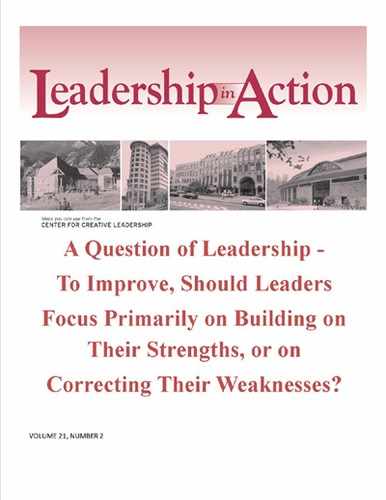A QUESTION of LEADERSHIP
ROBERT E. KAPLAN
Kaplan is an honorary senior fellow of CCL and founder and co-president of Kaplan DeVries Inc., a Greensboro firm that provides leadership consulting to executives and executive teams. He holds a Ph.D. degree from Yale University.
This question has had a long life in leadership theory and practice. And contrary to what the question may imply, there is no simple answer.
First of all, it does make sense for managers and leaders to build on their strengths by, for example, choosing assignments that play to their strengths.
A classic example is the manager who has a natural aptitude for the tough job of turning around organizations. By specializing, managers become increasingly adept at their specialties over time. By being well matched to their jobs, they not only exploit their assets but also neutralize or reduce the impact of their liabilities.
Assignments help only so much, however, because some types of weakness follow managers wherever they go. Regardless of the job at hand, these weaknesses hurt a manager's effectiveness and are therefore worth fixing.
Some managers, for example, intimidate and overwhelm their people and therefore fail to get their full contributions. Other managers have trouble taking a stand and back down too quickly when they run into resistance.
In addition, specializing too heavily over the course of one's career can trap an individual in that specialty. For example, a manager who is a fix-it specialist, upon reaching senior management, may find that his or her career options are constricted. The same limitation can affect functional managers who, in addition to being exceptional professionals themselves, become masters at managing other professionals in their field. Managers who make a career of building on strengths can wind up narrowing themselves by sacrificing breadth.
Strengths and weaknesses, rather than being independent of each other, are often flip sides of each other.
Ironically, correcting one's weaknesses often entails building on one's strengths, in the sense of making better use of those strengths. The reason is that strengths and weaknesses, rather than being independent of each other, are often flip sides of each other. Strengths, when taken to the extreme, can become weaknesses. To correct weakness of this type, managers need to modulate their use of their strengths. There is nothing wrong, for example, with being open to input and changing one's mind, as long as one doesn't do it all the time. The key is being selective.
A little-recognized key to making optimal use of one's strengths and at the same time ameliorating areas of weakness is to truly recognize and internalize those strengths. In my work with executives, I have found that many of them underrate one or more of their strengths. In underestimating how good they are, they overcompensate in their efforts to be good.
The areas in which executives feel inadequate are usually areas on which they place a high degree of importance. Because they worry that they aren't good enough in these much prized areas, they have trouble being objective about how good they are. Even when they receive positive feedback about their performance in these areas, they tend to discount it. Their overcompensation is fueled further by their natural tendency to focus on correcting weaknesses because they believe that is the way to improve.
It is a given that leaders have to face up to their weaknesses before they can fix them. What hasn't been appreciated as well is how important it is to the development of leaders for them to come to terms with their strengths.
